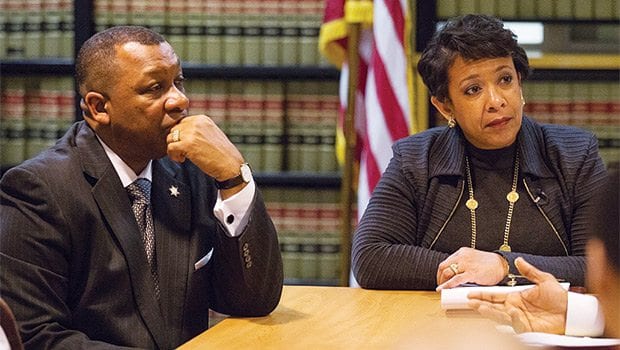
Last year, President Barack Obama made criminal justice reform a priority for his administration, underscoring his commitment with a visit to a prison – a first for a U.S. president.
Last week Obama’s attorney general, Loretta Lynch, visited the Suffolk County House of Correction for a discussion of criminal justice reform, reentry programs and efforts to reduce recidivism.
Speaking in a meeting room full of nonprofit and government workers who provide services to inmates and newly-released ex-convicts, Lynch told the gathering that she understands the importance of their work.
“The work you are doing is indeed important to real people,” she said. “It makes change in real lives. I want to thank you for believing in people who society wants to write off.”
Much of the work that sheriffs, police and probation officers, nonprofits and clergy do to help former inmates learn skills and find housing and work after their release is funded in part by the Second Chance Act of 2007, a federal program which has given out $400 million in grants over the last eight years – and $53 million last year.
One critical reform the administration is pushing this year is to lift restrictions on Pell Grants that bar people with drug convictions from qualifying for educational aid. Lynch said the administration is working on a pilot program to allow some students with drug convictions to receive the grants.

Boston Reentry Initiative Director True See Allah addresses U.S. Attorney General Loretta Lynch during a meeting at the Suffolk County House of Corrections.
Officials at the meeting said Massachusetts is making considerable progress turning around a criminal justice system that has long emphasized punishment over rehabilitation.
“Criminal justice reform is a top priority for us,” said Massachusetts Attorney General Maura Healey, who recently testified in favor of legislation that would end automatic driver’s license suspensions for people convicted of drug crimes.
The Massachusetts House voted in support of that legislation earlier this month.
Suffolk County Sheriff Steve Tompkins said the president’s support for criminal justice reform, along with the support of Gov. Charlie Baker and Mayor Martin Walsh, bodes well for reentry programs that help people find work upon release from jail.
“I think now you’ll see the support you need to stem the tide of mass incarceration,” he said. “There seems to be more willingness to help folks before they find themselves in trouble. We’ll see a further decline in incarceration and we’ll see more people getting help.”
Public officials in Boston have been working since the 1990s on programs to help re-integrate people being released from prison. The programmatic approaches to reentry have evolved over the years from job placement to career counseling.
“We can’t do training alone without offering a job and a real career path,” Trinh Nguyen, director of the city’s Office of Workforce Development, told the Banner. “If we get someone a job with Dunkin’ Donuts, we have to keep working with them to get them on a real career path.”
In her remarks, Lynch stressed that people being released from prison are helpful to the economy.
“When you look at the number of people wo are released from an institution ever year — 600,000 — the human capital that represents, what you see is that the individuals who are coming out are a resource,” she said. “We cannot afford to throw away a resource.”
She highlighted the efforts of one contractor who has hired ex-offenders from the Suffolk County House of Correction for jobs as laborers, carpenters and foremen.
Lynch praised Sheriff Tompkins and others for their efforts to help ex-offenders find work.
“This is, in fact, the issue of the day,” Lynch said. “And the effort here in Boston and in Suffolk County is tremendous.”
Before meeting with government officials and nonprofit workers, Lynch met with Suffolk County inmates who are participating in job training program participants. She stressed the importance of the networks of support the inmates have.
“What I was struck by was how graciously they shared their stories and their pasts and how their paths were really very similar,” she said. “They’ve found people here who believe in them and have helped them to build a foundation, people with whom they’ve essentially formed a family here inside this institution. They’ve helped them to move back home, move back with families, move back with communities and move back into life.”






